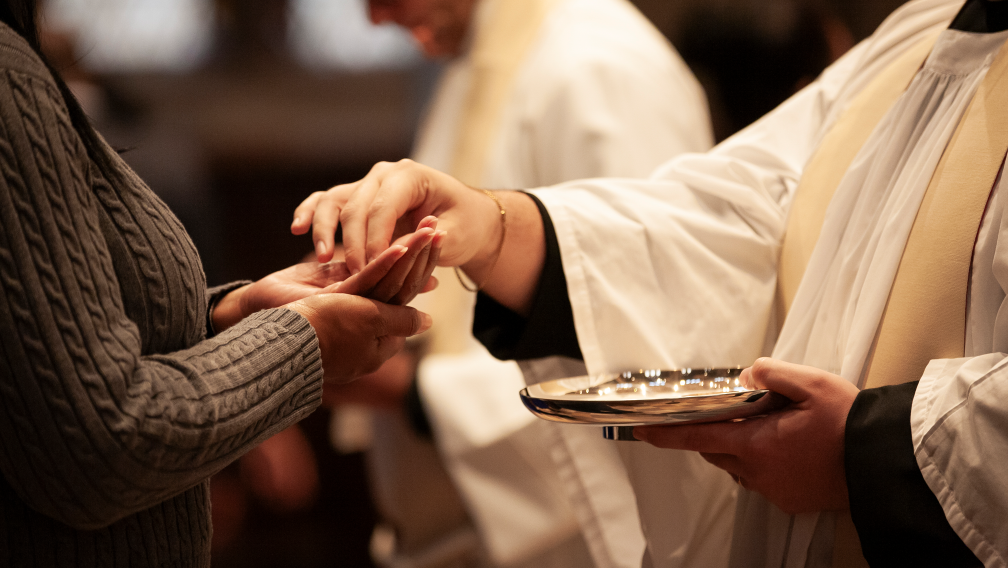“He called the crowd with his disciples, and said to them, ‘If any want to become my followers, let them deny themselves and take up their cross and follow me.’” — Mark 8:34
A Look Ahead to Sunday’s Readings
At a certain point in our lives, usually when we can’t help but face it, we begin to think about mortality. How will we be remembered when we’re gone? What sort of mark, if any, will we leave on the world? Will our lives have mattered?
In the Gospel passage from this Sunday’s readings, Jesus openly foretells the story of Easter: his suffering, death, and resurrection. But his disciple Peter doesn’t accept it (“No, Jesus, not you!”). Jesus dramatically rebukes him, telling him he’s not focused on what matters.
Jesus then shares a central paradox of the Christian faith: Those who want to save their lives will lose them, and those who lose their lives will find them.
When we hold tightly to what we must release, we leave no room for new life to grow in its place.
Death isn’t a secret or surprise for any of us, even Jesus. In fact, it’s an essential part of being alive. But when we spend our time and energy fighting the inevitable, we lose sight of the life happening right in front of us. And when we hold tightly to what we must release, we leave no room for new life to grow in its place.
Jesus calls us each day to let go of the lives we know, pick up our crosses, and follow him — but in our own stories, just like in the story of Easter, death is not the end.
“There’s no ladder to holiness to climb, no self-improvement plan,” wrote late author Rachel Held Evans in Searching for Sunday, her reflection on what it means to be part of a church community. “It’s just death and resurrection, over and over again, day after day, as God reaches down into our deepest graves and with the same power that raised Jesus from the dead wrests us from our pride, our apathy, our fear, our prejudice, our anger, our hurt, and our despair.”
This Lenten season, may we remember the path to meaning, wholeness, and deep relationship with God and others is not around suffering but through it — not because God orchestrates or delights in our pain, but because God is with us in it.
Read all of Sunday’s scriptures.
Here are five ways to think more about what it means to lose our lives to find them:
Commentary Writer Debie Thomas imagines the bombshell effect of Jesus’s prediction on his followers: “Their great hope, cultivated over the three years they follow Jesus, is that he will lead them in a military revolution and overthrow their Roman oppressors. . . . So what can be more disorienting, more ludicrous, than the news that their would-be champion is determined to walk into a death trap?”
Theology In a powerful sermon, pastor Nadia Bolz-Weber suggests, “When Jesus says deny yourself . . . maybe it’s really denying the self that wants to see itself as separate from God and others. Deny the self that believes that spirituality is a suffering avoidance program.”
Poetry Reflecting on St. Teresa of Avila’s poem “Christ Has No Body,” Rachel Held Evans reminds us that we, driven by the Holy Spirit, can be the hands and feet of Jesus in our suffering world.
Spirituality Father Richard Rohr suggests that in looking at the crucified Christ, we allow our hearts to soften to all suffering, just as God’s heart has always been softened to us: “In turning our gaze to this divine truth — in dropping our many modes of scapegoating and self-justification — we gain compassion toward ourselves and all others who suffer.”
Music The longing at the heart of the spiritual “I Want Jesus to Walk with Me,” sung by the incomparable Marion Williams, evokes the heightened emotions during the exchange of rebukes in this week’s reading. One can picture Jesus stalking away, disappointed, frustrated, and weary, and Peter, utterly bewildered.
Subscribe for Trinity Updates
Get information about Trinity Church Wall Street and our latest programming.
